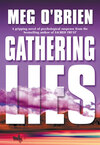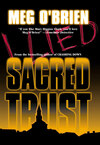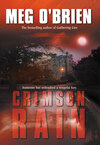Читать книгу: «Gathering Lies», страница 3
PART II
3
On that day in April when the Great Earthquake hit, none of us at Thornberry could possibly have guessed what lay ahead, or how it would affect every one of our lives.
I stepped out of my cottage that afternoon and lingered to drink in the view. Pausing for a moment on the small porch, I looked across fir and cedar trees to the sky above the Strait of Juan de Fuca. Here in the San Juan Islands, some eighty miles north of Seattle, the sky remained light somewhat longer than in the city. Even so, I hadn’t expected such an odd color of yellow at five in the afternoon. Nor had I expected the air to be so warm in April. It was the earliest spring in history, some said.
This was the first time I’d seen the sky like that, however. All week long clouds had hung over the islands, at least on those days when there wasn’t fog.
For long moments I gazed at the trees, my nose twitching at their sweet, woodsy scent. Primroses had popped up among the rocks that lined my path to the farmhouse road from my cottage—which was named, after Timothea’s deceased daughter, “Annie’s Rose.” Annie died from pneumonia when she was six, and Timmy had acquired a permit to have her buried on the property. A tiny cross marks the spot on a hill invisible from the farmhouse, but facing the sea.
There were only four homes on Esme Island, which was roughly oblong and three miles across from north to south. Ransford, the Ford house on the north side, was much grander than Thornberry, on the south shore. The other two homes were cabins, built in the 1950s and existing on Esme at the time Timothea and the Fords bought the island and built here. They lay to the west of Thornberry, along the shore, and were maintained by their original owners only as summer vacation homes.
This left Timothea quite isolated during the long winter months, which, I imagined, was why she’d set up a writer’s colony when the bed-and-breakfast closed. This way, she could still have year-round visitors.
She had apparently kept it manageable, however. There were only six residents’ cottages at Thornberry, each with different names and each beautifully crafted of cherry, pine, and cedar, with stained glass windows in the sleeping lofts. They dotted several acres of woodland surrounding the main house, which began as Timothea’s bed-and-breakfast all those years ago. Now called simply the “farmhouse,” it was a three-story white structure, similar in architecture to many of the lovely old homes in British Columbia. “What a romantic place,” my mother enthused the first summer we visited. “Perhaps we’ll meet our true loves here.”
She said it with that light laugh that surprised me every time it came out, as my mother was more often than not rather morose. I was ten at the time, and if I thought it odd that my mother—who had been married to my father for years—still spoke of finding her true love, I refrained from saying so.
The farmhouse now served as administrative office, kitchen, and nightly meeting place for resident writers. Timothea lived in the second-floor rooms, and two office assistants remained, weeknights, in private rooms on the third floor.
As for the cottages, none could be seen by the other. In fact, once settled in, the only sign of life nearby was a now and then wisp of smoke from the woodstoves of the other five residents. We were not permitted to speak to each other or disturb each other in any way, until four in the afternoon. This, Timmy explained, was to ensure that each of us had every opportunity to write.
Arriving at Thornberry in April, I was out on bail, my trial date set for August third. The prosecution had pushed for an earlier date, but my lawyer pushed back, pleading a full schedule. In truth, she was giving me time to finish the book. I knew there would also be the usual delays and continuances, and did not expect my trial to go forward till December, at the earliest.
Which thrilled my publisher. Though I wouldn’t turn the manuscript in until October, they planned to push Just Rewards through production virtually overnight, with a pub date of December 1. From the publisher’s point of view, it was worth the unusual effort, as the trial would help to make it a bestseller. From my lawyer’s point of view, I’d be getting it into the hands of the legal analysts—the talking heads on TV—right when it might do me the most good. They were known to come down hard, lately, on crooked cops. And since crooked cops were my best, and only, defense, I said sure, let’s pull out all the stops.
I was ready, by then, to play any angles to bend, and if necessary, beat the judicial system.
Seeing Timmy here again after so many years, I had mixed feelings. It had been two decades since I’d last been at Thornberry, and we both had changed. Timmy, though, seemed unusually strained. I mentioned this to Dana, one of the other residents, as we walked together toward the farmhouse for dinner. I’d run into her before, coming from her cottage, and we’d found it easy to talk to each other. For the most part, we talked about the other residents and how we felt about them. Gossip, I suppose—something I seldom indulged in. But at Thornberry, after the first few days of daily isolation, we were all still wondering about each other.
This night, I shifted the basket of books I’d brought with me to return to the farmhouse library, and brought up the subject of Timothea.
“I knew her a long time ago,” I said, “and she always seemed a happy person, one who knew precisely what she was doing in life. I thought she found contentment in it.”
“Well, it must be difficult dealing with five different writers a month,” Dana said. “Having to sit with us at dinner, listen to us jabber. Have you ever seen such a bunch of—” She hesitated.
I knew the word she was going for, and revised the first letter of it. “Witches?”
She laughed. “Except for Jane. She seems nice. I feel sorry for her, though. Grace just won’t let her be.”
Jane was a well-to-do young matron from Bellevue, and Grace Lopez a tough, mouthy New Yorker. Grace was thin and wiry, with short black hair, an olive complexion, and a temperament straight from the Bronx. So far, Jane hadn’t been doing very well at holding her own with her. Jane was writing a romance novel, and if there was anything Grace seemed as if she’d know nothing about, it was romance.
I myself had become bored with the kind of tensions that seemed to develop over dinner every night. Aside from Jane and Grace, there was Amelia, a seventy-two-year-old curmudgeon and prize-winning poet. She and Grace would get into something volatile, and Jane would leap in to smooth things over, then get caught in the runoff.
One member of our group that I hadn’t had time to form an opinion about was Kim Stratton, the Hollywood actress who’d suddenly found herself, with one hit movie, on a level with the best. Her succeeding films reportedly raked in more than the national debt, yet Kim had come to Thornberry to write her memoirs, she had told everyone on the one night she’d shown up for after-dinner coffee. The majority of the time she kept to herself in her cottage, and had acquired a reputation with the other women for being standoffish.
What kinds of memories this auburn-haired beauty felt impelled to be writing about at age thirty, I couldn’t imagine. Still, she was known as “America’s Sweetheart”—at least to those not old enough to remember that Mary Pickford once held that title. Presumably, enquiring minds wanted to read everything they could about Kim Stratton.
“So you think Timothea’s just bored with us all?” I asked Dana, as we continued toward the farmhouse.
She gave a shrug, and the silver-and-turquoise necklace she wore shimmered in the yellow light. Dana, from Santa Fe, was often mercifully teased by Grace for being psychic, or Santa “fey.” I knew little about her life in New Mexico, as she seldom talked about it. There was a husband, I’d learned. But the kind of person he was, and what he did for a living, seemed shrouded in mystery.
“You seem to know her better than any of us,” Dana answered. “What do you think?”
I wasn’t certain. I no longer felt I knew my old friend, and could only ascribe this to time passing, personalities changing. I’d grown up, while Timothea Walsh had grown older. I had no idea of the forces that had moved through her life, twisting and shaping it in ways perhaps different, but just as powerfully as forces that had shaped mine.
We turned a bend in the path, and I felt myself shiver.
“You feel it, too?” Dana asked. Her dark hair moved in fine wisps over her forehead as she turned her head from one side to the other, seeming to sniff the air.
“Too?”
“This spot,” she said, pulling her fringed shawl more tightly around her. “It’s very strange.”
She was right. The air was unseasonably warm, the sky still that strange, heavy amber. But there was something else along this one patch of trees. Every time I passed it, my legs would begin to feel weak, as if I could barely move. It was like slogging knee-deep through mud, and it lasted a few yards, then was gone.
“Old Indian ground,” Dana said. “I read about it in the library here. Energies like that, you know, have a way of lingering.”
My legal training had not prepared me for this kind of thinking, yet I couldn’t deny that something about this spot was unnatural.
“There may even have been mass murders here,” Dana continued in a low voice, “when northern tribes raided down here, killing the men and taking wives and slaves back with them.”
Her words echoed something from time past. What was it? Where had I heard this before?
It took a moment, but as we continued to walk, my thoughts flashed back to the year I turned eighteen. And Luke.
Luke Ford’s family owned Ransford, the larger home on Esme Island back then, and during the four summers I spent here, we had worn a path through the woods from visiting back and forth. Luke had commented more than once about the strange energies in the woods around here. How had I forgotten?
Luke had been my first love, and the exact opposite of Ian. Ian was all business, red hair cropped short, demeanor dead serious, while Luke joked, teased, flirted outrageously, and in general embraced life fully. He wore his thick, almost kinky dark hair in a ponytail that ended midway down his back. When he didn’t have it contained that way, it flowed around his face, framing and softening features that were sharp and angular—more striking than handsome.
I was seventeen the last summer I spent on Esme Island, and I could not get enough of Luke. Having flirted our way through the three previous summers, lightly touching each other, then pulling back as if burned by a hot poker, we were primed that year.
We started out the first day smiling awkwardly at each other, then glancing away; our eyes, when they met, spoke too much of our feelings. One day I was walking in the woods, looking for a quiet place to write. Luke hid in a tree and nearly startled me to death, dropping to the ground in front of me. Then he whisked me into his arms with a great holler and whoop.
“Sarah! My God, I missed you this year!”
We fell to the ground together, laughing, and from there on out, I was all his. His tongue parted my lips, while a hand came between my legs to create a passage there, as well.
When it was over, my back was scratched from dry pine needles on the forest floor. The discomfort I suffered was well worth it, however. It had been my first time, and for days I was consumed by memories of Luke stroking the entire length of my body till I was nothing but a quivering mass. I sought him out, sought that feeling over and over. The woods became our trysting place, while I became Guinevere and he Lancelot, having an illicit affair behind King Arthur’s back.
There was no king, of course, to cuckold. Only our parents, who thought we were still “just friends,” enjoying each other’s company on a lonely island every summer with few inhabitants, no television, no movies, and nothing, really, to do.
If they had known what we were up to, there would have been hell to pay. Both my parents and his were conventional, his mother almost saintly. This forbidden aspect only served to heighten our sense of danger, and therefore our lust. We experimented in ways neither of us ever had, and when we parted at the end of the summer, it was—at least for me—with a feeling of being wrenched from my soul.
It took me a long while, after that—years of law school, work and aimless dating—to fall in love again. That it was Ian I fell in love with is a mystery to me now. I never gave myself fully to him, and many’s the time I felt obligated to call up memories of that summer with Luke, to convince Ian that he’d satisfied me—that I’d felt all I was obligated to feel.
After that year, I didn’t see Luke again, though I heard about him a few times through my mother, who exchanged Christmas cards with his family for a time. Luke, Mrs. Ford wrote, had traveled in Europe after college, then worked in New York City. She never said exactly what he did for a living, and I remember thinking that with his lively personality he might be involved in anything from acting to simply hanging out, “following his bliss.” As far as I knew, he’d never married.
I wondered if he still came to the island, and if I’d see him here. Not likely, after all these years. Still, the thought brought with it a small jolt of excitement—something I dismissed immediately as a visceral carryover from adolescence, nothing more.
“Where did you go?” Dana asked, snapping me out of my reverie.
“Hmm? Oh, sorry. I was thinking.”
“Odd weather, isn’t it?” she said.
We were nearing the farmhouse, with its gardens leading down to the rocky beach. She scanned the horizon with a frown. “The water seems choppy, today. Odd, since it’s so warm.”
“I was just thinking that myself.”
Dana laughed, though the sound came out a bit hollow. “I lived in L.A. once, and we’d call this earthquake weather.”
“Well, they do keep warning us that the Big One’s coming,” I said.
A lush scent of roasting pork and freshly cooked vegetables drifted our way from the farmhouse. We stepped up our pace, and inside the kitchen we took seats on picnic-style benches at a long table, with the other writers and Timothea Walsh. Timmy and I had talked the first day I’d arrived, but not since, except to say hello in passing. She had asked about my mother, and I’d told her Mom was living with her sister in Florida, and doing well.
“I’m so sorry about your father,” Timmy had said. “But I must say…”
She had paused, then shaken her head and clamped her lips shut.
“You think she’s better off?” I pressed.
She fluttered a thin, white hand at her chest. “Well, Sarah, it’s not for me to say…but your mother’s life was never an easy one.”
I thought she’d meant because of my father’s tendency to work such long hours, so I just nodded, and we both changed the subject.
Now I looked across the table at Timmy and wondered. She kept glancing at me when she thought I wasn’t watching. I’d feel her eyes on me, and when I’d look up to meet them, she’d quickly turn away.
Lucy, the cook, was at the stove ladling out food. The daytime office staff had already left on the Friday night ferry for their homes on Whidbey. The ferry, which was privately owned and only stopped at Esme two days a week, would come again on Monday morning, bringing them back. Any other time, we couldn’t get off the island if our lives depended on it.
As, of course, they soon would.
The dinner conversation droned on and on. Another long evening, I thought, picking at the last morsel of roast pork on my plate. Dinner, then coffee in the living room. People reading their works-in-progress to each other, critiquing each other, sometimes being careful and delicate in their comments, other times hard as nails.
Though, come to think of it, only Amelia and Dana had read aloud in the five days we’d been here. And Amelia was usually the only hard-nosed critic. Even Grace was often silent when either woman read, as if she really didn’t know what to say.
The thought struck me suddenly that Grace might not be a writer. Almost immediately, I shook that off as silly. I’d been living in my mind too much of late, seeing shadows in every corner.
Still, I had thought I’d feel safer here on Esme Island than I did. There were moments, in fact, when I felt certain I was being watched.
“This warm weather is so wonderful!” Jane offered from across the table.
Jane was tiny, with short brown hair and a self-deprecating demeanor. I wondered if her size, which was not more than five foot one, caused her to feel incapable of making a mark on the world.
“I thought it would never stop raining this winter,” she went on. “In fact, at one point I thought if I had to put boots and raincoats on one more child, just one more day, I’d go crazy.”
“How many children do you have?” Timmy asked.
“Only two. It just seems like an army sometimes.” Jane smiled uncertainly. “That’s why it’s so good to be here. My husband gave me this two-week vacation as a birthday present. He’s working from home while I’m gone, so he can watch the kids.”
“You’re only here for two weeks?” I asked curiously. “I understood we’d all been invited for a month.”
Jane’s grimace was half smile, half frown. “We were, but I didn’t think I could be away from home that long. As it was, I spent a full week in the kitchen before I came here, making my husband’s favorite dishes and freezing them. He doesn’t know how to cook.”
“Some vacation,” Grace muttered. She frowned and shook back her cropped black hair, then folded her arms across her chest. Grace’s name did not at all fit her, as she was totally lacking in any of the graces. In fact, I had yet to hear her utter a good word about anyone.
Jane seemed to hunker more inside herself. She didn’t respond.
Amelia turned to Timmy and asked where Kim Stratton was.
“She’s having dinner in her cottage,” Timmy answered. “She did say she might join us later for coffee.”
Amelia harrumphed, then made small talk with Timmy about Thornberry, while Jane, Grace, Dana and I listened. Timmy sat every night at the head of the table, and as I’d noted to Dana, she didn’t seem particularly comfortable to be there. She seldom took part in our conversation unless asked a direct question, and I recalled that she had seemed a bit shy when I was younger. I wondered silently if she’d rather have dinner alone than with a group of edgy writers.
“I abandoned the bed-and-breakfast years ago,” she was saying now to Dana. Her hand went to smooth her short gray hair, a large diamond ring reflecting light from candles and sending sparkles around the table.
“It was far too much work,” she continued. “Not that this isn’t, but since you all do your own laundry and housekeeping, it’s quite a bit easier.”
A staff member—either Lucy or one of the two administrative assistants—brought lunches to the six cottages every day at noon, setting them on the porches without knocking or in any way disturbing the writers. Lunches were hearty soups or stews and homemade breads and muffins. At dinnertime, each writer brought her own basket back to the farmhouse and filled it with whatever she wanted for breakfast the next morning—eggs, bacon, muffins, fruit. Each cottage had its own small kitchen, and residents fixed their own breakfasts. There was no charge for any of this.
Thornberry, I’d been told by Bill Farley, was one of the most luxurious writer’s colonies in the country now. Timothea was a former patron of the arts from Seattle, a woman who had always wanted to help other women find their place in the writing world. When she had first sat me down at her dining room table with pad and pencil all those years ago, I hadn’t known this. I thought she was just being nice to the lonely kid with her nose in a book.
Now I understood the genuine kindness that lay behind Thornberry’s latest incarnation. There were no “page police,” no monitors of one’s work. The only thing Timothea asked was that the women who came here grow in some way that might further their talent. How they did that was their own business. They might take walks in the woods, keep a journal, help out with the organic farming, or even—if they wished—simply feed the two resident goats.
The conversation this night, dominated by Grace as usual, turned to politics. Since my life in Seattle had been saturated with troublesome politics, I had difficulty participating. But Grace was young and brash. She liked to mouth off for the sake of mouthing off, reminding me of certain teenagers I’d defended over the years—though Grace was clearly in her mid-to late-twenties.
“We’ve got to fucking bomb them,” Grace said firmly. “It’s the only way.”
This brought me out of my woolgathering long enough to wonder who she was talking about. Iran? The cornfields of Iowa? Anything could be turned into an enemy by this woman, I had learned.
Dana jumped in with an obvious attempt to change the subject. “Lucy, I love the way you use herbs in your cooking,” she called out to the cook, who was putting cookies for dessert into the oven.
“Thanks,” Lucy said. “You’re writing about herbs, aren’t you? We should talk one of these days.”
“I’d love to,” Dana said. “It’s not all about herbs, but they’re a large part of it. It’s about using what nature gave us, to heal—something even doctors are beginning to believe in.”
“Doctors!” Amelia, the poet, said scornfully. “I’ve never in my life gone to a doctor that I didn’t end up sicker than I was in the first place. And to add insult to injury, they put you in the poorhouse doing it.”
Dana smiled. “That’s how I got started on my book. I was sick, and as a writer, I couldn’t afford insurance. I began to study herbs and what they could do.”
“I don’t give much ground to herbs, either,” Amelia muttered. She tapped her forehead, and her short white curls bobbed. “It’s all in the mind. Doesn’t matter what you take, it’s in the mind.”
“Oh…” Jane began uncertainly, “you mean, you could take either prescription medicine or herbs, and depending on which one you believed in—”
“Turnips!” Amelia snapped. “You could take turnips, woman! It doesn’t matter what you take, it’s all in the mind.” Grace cast a contemptuous look at both of them and went back to stabbing her pork.
Dana, who didn’t eat meat, picked at her vegetables. An awkward silence filled the kitchen, and Jane stepped in again, changing the subject. Laying down her fork, she stretched and sighed.
“What a wonderful meal! You know, I can’t believe I’m here. After the PTA, the constant laundry, the carpooling—this is heaven.”
“Don’t tell me you don’t have a house full of servants,” Grace taunted.
“No. No, I don’t,” Jane answered slowly. “I have a once-a-week housekeeper, that’s all.”
“But a house that’s big enough for an army, I’ll bet,” Grace replied, zeroing in. “You people with your big houses, big cars, big everything—you’re ruining the world.”
“Grace!” Dana said softly. “You can’t just lump everyone—”
“Don’t give me that!” Grace interrupted. “It’s true. The rich are responsible for most of the ecological problems in the world. Everyone knows that.”
“Well, we don’t have to talk about it now,” Dana said mildly, casting a sympathetic glance at Jane. “Can’t we, for once, just have a nice dinner?”
“And just exactly when would you recommend we talk about the way the rich ruin the world?” Grace pushed. “What nice dinner would you prefer to ruin?”
Jane, turning a deep shade of red, stood and carried her plate to the sink. “I think I’ll turn in early,” she said.
I felt sorry for her. And just as sorry for myself. There were times when I thought I couldn’t stand another dinner with these women. Always fighting, arguing, picking on each other.
All but Jane, who tried, but didn’t have the ongoing fortitude to stand up for herself. And Dana, who did her best to keep the peace.
The rest, excluding Timmy, reminded me of children. Women in their twenties, thirties, forties, even seventies—going on five years old. Put a bunch of women together on an isolated island, and see what you get.
Later, I told myself that if I’d known how bad things could really get, I might have made a point of enjoying my “final meal.”
Jane would echo my thoughts. “If only I had known…” she would say numbly, over and over—though even she knew it was bad form to write that in a novel.
We were in the living room of the farmhouse when it happened—Grace, Amelia, Dana and myself. Jane had gone back to her cottage, and Kim Stratton hadn’t shown up at all. Timothea and Lucy were in the kitchen, cleaning up.
As was usual after dinner, we had gathered in comfortable chairs and sofas before the huge stone fireplace. A large bouquet of freshly cut flowers filled the hollow of the fireplace rather than wood, a nod to the overly warm weather that had fallen over the San Juans this day.
All four of us were at varying stages in our writing lives. Dana was working on her nonfiction book about natural healing, Amelia on a new poetry collection, and Grace…Grace never did say. The only thing I knew at this point was that she must have had a strong reason to come to this isolated island of few inhabitants and very little communication with the outside world. Esme was owned by Timmy and two of the other home owners on the island. Electricity came by way of generators, and water by wells. There was one battery-operated radio in the Thornberry office, and one cell phone serviced through a tower on Orcas. We had been asked to leave our own cell phones behind, and Timmy believed that she and the staff should live as simple a life as the residents here.
As for weather, it could get wild here even in the spring, with gale-force winds and unending storms. No one came to Esme without a good reason.
That night, however, had started out peacefully enough. Through French doors we could see a setting sun. A family of deer munched on grass on the lawn. Dana smiled and said, “Jane was right. This really is heaven.”
Amelia snorted. “Heaven, is it? Well, if you run across God, ask him how we’re supposed to keep those bloody little woodstoves going in the cottages. Someday I’d like to write an entire ten-line poem before the damn thing goes out.”
Dana sent a grin to me, and I turned to Amelia. “You sound like you don’t like it here.”
Amelia folded her arms across ample breasts. “I didn’t say that, did I?”
I smiled. “No, you didn’t say that.”
“Well, don’t go putting words in my mouth.”
Amelia stared into the fireplace as if flames flickered there.
Perhaps Dana was right, I thought. Old trauma—murders, even—must be hanging around Thornberry. Otherwise, why were so many people here in a bad temper?
Tonight was worse than ever. There was something in the air, and it was affecting everyone. Kim Stratton, I thought, knew what she was doing, hiding out at night. From now on, I vowed, I would do that, too.
“Well, I guess I’ll get started,” Amelia said, pulling a thin sheaf of white paper from a needlepoint briefcase.
I stifled a sigh. Here we go again. More cutoff breasts and blood gushing from women’s vaginas into male-dominated ground. God save me from the political ones.
Amelia’s latest was indeed another politically driven, and—to give it credit—probably award-winning piece. I closed my eyes and tried to pretend I was listening, while in truth I was working on my own book in my head.
I felt a jolt, and my eyes flew open.
“Did anybody else feel that?” Grace asked.
Amelia looked up from her paper and frowned. “Feel what?”
Grace rubbed the back of her neck. “I don’t know…I thought I felt something.”
“You did,” I confirmed. “I felt it, too.”
“Probably a gust of wind,” Dana added. “Coming from the kitchen. Lucy’s got the door open back there.”
Amelia returned to her reading.
“Damn, there it goes again!” Grace jumped to her feet.
Her words were barely out before the room shook violently.
“Earthquake!” Dana cried, her mouth forming a startled O. She grabbed the sides of her heavy armchair as it slid like dollhouse furniture along the hard-wood floor, striking the fireplace and throwing Dana into the hard stone facing. She screamed. Grace staggered and fell several feet across the room, hitting a coffee table with her knees and falling into a bookcase. Blood spurted from her nose. The bookcase pitched forward, burying her beneath it. I rose and stumbled for balance, grabbing Amelia, who looked so pale I thought she might faint. There was nowhere to go, however. Nowhere to hide.
All around us, windows shattered. Glass rained down. The tiny panes of the French doors were sharp slivers. I felt a stab on my cheek as figurines, now projectiles, flew from the fireplace mantel and shelves. Mini-blinds rattled and broke, falling to the floor with a clatter. The deep rolling motion went on and on, seemingly forever, and the piercing screech of Thornberry’s house alarm filled the night.
When the rolling and pitching was over, we were all in various positions on the floor. Dana lay against the hearth, blood dripping from her arm. Grace, still buried by the bookcase, groaned, but pushed at its weight and crawled out from under. Her nose was bleeding, and Amelia, next to me, looked dazed, her mouth drooping open.
I struggled to my feet, holding onto an end table. Heading across the room to Dana, I felt the warmth of blood trickling down my cheek. The living room was cluttered with debris; plaster had fallen from the ceiling, and glass crackled under my feet as I gingerly moved first one heavy beam, then another that had fallen from the ceiling. Sliding on a pile of books that had landed in the middle of the floor, I fell to a knee and yelped as a sliver of glass cut through my skin. Red flowed through my khaki pants.























